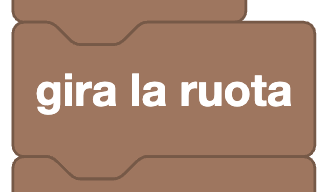Block Code
You can use Blockly to create problems that require a block code answer. The problem text should contain a Blockly component:
import customBlocks from "./custom.blocks.yaml";
import initialBlocks from "./initial-blocks.json";
import testcases from "./testcases.py";
import visualizer from "./visualizer";
Problem text...
<Blockly
customBlocks={customBlocks}
initialBlocks={initialBlocks}
testcases={testcases}
visualizer={visualizer}
/>The Blockly component must have the following properties:
customBlocks: the custom blocks for the problem.initialBlocks: a JSON file containing the blocks and variables initially present in the problem's block editor:jsonThis can be generated manually, but it's more convenient to generate it using the "Debug" button during problem development.{ "blocks": { "languageVersion": 0, "blocks": [...] }, "variables": [...] }testcases: an array of objects containing the test case variables. It can be imported from a Python or JSON file or defined directly in JavaScript within the problem file.json[ { "N": 4, "A": [1, 2, 3, 4] }, { "N": 5, "A": [5, 4, 3, 2, 1] }, ... ]visualizer: a React component that visualizes the test case state:jsxThe function receives user-defined variables and the test case state as parameters. Initially, the state corresponds to the test case variables and is updated during block code execution.function Visualizer({ variables, state }) { ... }
Custom Blocks
There are two types of blocks: statement blocks and output blocks.
- statements are blocks that perform an action without returning a value. They can be connected to another block above or below:

- outputs are blocks that return a value and can be used as parameters for other blocks:

ATTENTION
Blocks must be defined within a YAML file with a .blocks.yaml extension.
Each block has the following fields:
type: block ID.message0: text shown in the block. It must contain%1,%2, ... placeholders for block arguments.args0: list of block arguments.colour: block color. It can be a number between 0 and 360 or an RGB string.tooltip: text that appears when hovering over the block with the mouse.maxInstances: maximum number of allowed blocks of this type. If not specified, the number of blocks is unlimited.js: a string containing the JavaScript code to execute when the block is run. The code can contain%1,%2, ... placeholders for arguments which will be replaced with the argument code. In output blocks, the code must be a single expression that returns a value.ATTENTION
The code must conform to ES5 JavaScript specifications, so most modern functionalities are not supported.
Statements can have the following additional fields:
previousStatement:nullif the block can be connected to another block above.nextStatement:nullif the block can be connected to another block below.
Outputs must have the following additional field:
output: type of block output:Number,String,Array, orBoolean.
Example of a statement block
- type: turn_wheel
message0: turn the wheel
previousStatement: null
nextStatement: null
colour: 20
tooltip: Turn the wheel by one section
js: state.angle = (state.angle + 45) % 360;Example of an output block
- type: minimum
message0: minimum between %1 and %2
args0:
- type: input_value
check: Number
- type: input_value
check: Number
output: Number
colour: 20
tooltip: the minimum value between x and y
js: Math.min(%1, %2)Block Arguments
An argument is represented by an object with a type field specifying the argument type, and additional fields depending on the argument type.
QuizMS supports two types of arguments:
field_dropdown: a dropdown menu with predefined values. Theoptionsfield must contain the list of dropdown menu options, each option is represented by an array of two elements: the displayed text and the generated JavaScript code.yamlargs0: - type: field_dropdown options: - [addition, SUM] - [difference, DIFF] - [product, PROD] - [division, DIV]input_value: an output block that can be connected to this block.The
checkfield specifies the type of block that can be used:Number,String,Array, orBoolean. QuizMS also adds theIntegertype which extends theNumbertype by validating during execution that the value is an integer.You can also specify
minandmaxfields to validate during execution that the value is within the two extremes; the fields must contain JavaScript code.yamlargs0: - type: input_value check: Integer min: "1" max: state.N